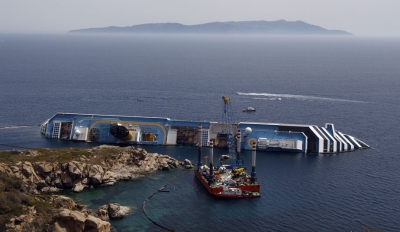Viewing entries tagged cruise ship security

By Press Release
Press Release
Guest has not set their biography yet
User is currently offline
| Saturday, 16 February 2013
|
Comments
|
Subscribe to updates
Costa Concordia Lays On Her Side
The international cruise industry must proactively face up to its challenges and respond openly to criticism, according to a leading expert in the sector and one of the critical area is safety and security.
Following the Costa Concordia accident at the start of 2012, cruisers still consider cruises to be a safe option, Professor Alexis Papathanassis, from the University of Applied Sciences in Bremerhaven, Germany said at Pisa forum. Nonetheless, according to a research study he supervised, approximately half of the respondents expressed doubts on the crew’s ability to deal with an emergency and clearly perceived safety as their own responsibility. This finding could serve as a valuable input to the improvement of safety procedures and information policies on board, he said.
Moreover, Papathanassis was particularly critical of the working conditions for cruise ship staff, especially salary-levels, which effectively mean that many workers rely on tips while working long hours and living under suboptimal conditions. In this light, some labour organisations accuse cruise-ships of being more like “sweat-ships” (a pun on ‘sweatshop’ factories), he noted.
Obviously, what constitutes fair pay and acceptable working conditions can be conveniently seen as a relative matter defined by the living standards in the crews’ source countries and by the recruiting structures in the corresponding labour supply chains. At the end of the day though, it is matter of perceived responsibility and ethical imperative at the consumption-end of the cruise supply chain (i.e. cruise operators and guests).

By Press Release
Press Release
Guest has not set their biography yet
User is currently offline
| Saturday, 16 February 2013
|
Comments
|
Subscribe to updates
Costa Concordia Lays On Her Side
The international cruise industry must proactively face up to its challenges and respond openly to criticism, according to a leading expert in the sector and one of the critical area is safety and security.
Following the Costa Concordia accident at the start of 2012, cruisers still consider cruises to be a safe option, Professor Alexis Papathanassis, from the University of Applied Sciences in Bremerhaven, Germany said at Pisa forum. Nonetheless, according to a research study he supervised, approximately half of the respondents expressed doubts on the crew’s ability to deal with an emergency and clearly perceived safety as their own responsibility. This finding could serve as a valuable input to the improvement of safety procedures and information policies on board, he said.
Moreover, Papathanassis was particularly critical of the working conditions for cruise ship staff, especially salary-levels, which effectively mean that many workers rely on tips while working long hours and living under suboptimal conditions. In this light, some labour organisations accuse cruise-ships of being more like “sweat-ships” (a pun on ‘sweatshop’ factories), he noted.
Obviously, what constitutes fair pay and acceptable working conditions can be conveniently seen as a relative matter defined by the living standards in the crews’ source countries and by the recruiting structures in the corresponding labour supply chains. At the end of the day though, it is matter of perceived responsibility and ethical imperative at the consumption-end of the cruise supply chain (i.e. cruise operators and guests).







